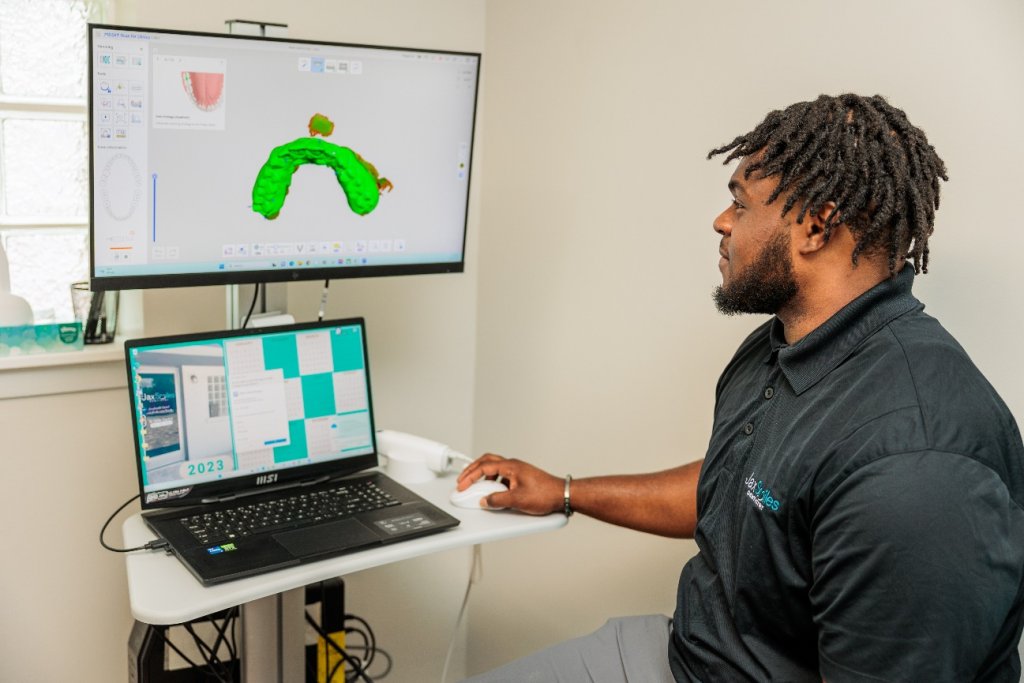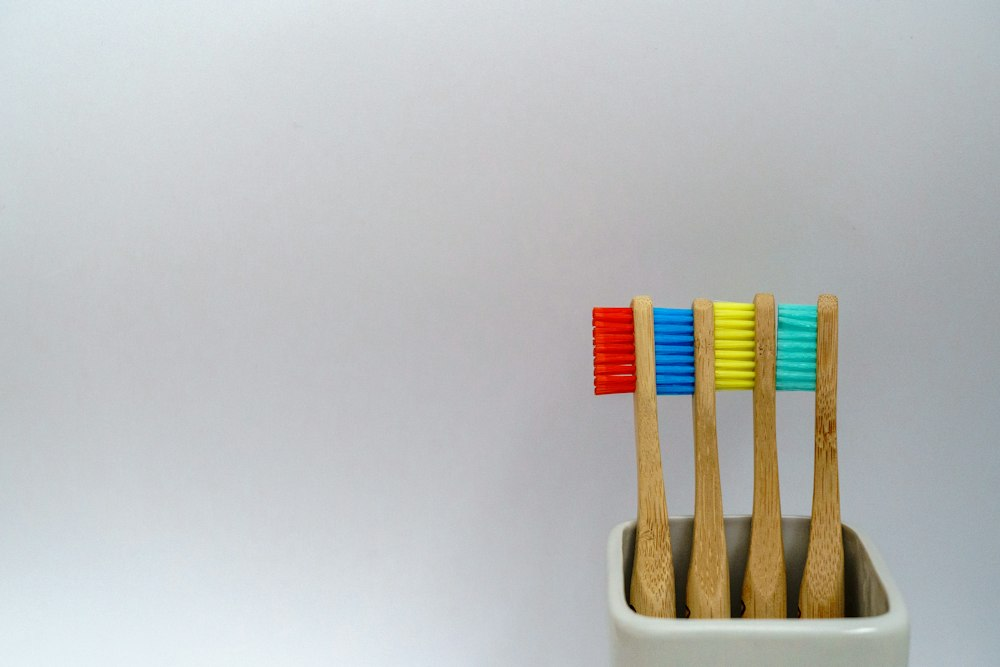When it comes to caring for our children, ensuring their oral health is a key component of overall well-being. Routine dental exams play a pivotal role in laying the foundation for a lifetime of healthy smiles for kids.
At Jax Smiles Dentistry, we understand the importance of dental checkups for kids. With a team of professional pediatric dentists, we provide top-quality, comfortable, routine dental exams for kids in Jacksonville, FL.
Preventing Cavities:
Childhood cavities are common and can have long-lasting effects on oral health. Regular dental exams allow dentists to detect early signs of decay, enabling timely intervention to prevent cavities from progressing.
Professional cleanings during these visits also remove plaque and tartar, reducing the risk of tooth decay and gum disease. Establishing good oral hygiene practices early on can significantly contribute to cavity prevention and promote healthy dentition.
Addressing Developmental Concerns:
Childhood is a critical period for dental development, with primary teeth laying the groundwork for permanent teeth. Routine dental exams enable dentists to monitor the growth and development of the child’s teeth and jaws.
Early detection of developmental issues, such as malocclusions or bite problems, allows for timely intervention, potentially reducing the need for extensive orthodontic treatments later in life. Identifying and addressing developmental concerns early on contributes to a child’s smile’s overall health and alignment.

Establishing Positive Oral Hygiene Habits:
Routine dental visits serve as valuable educational opportunities for both parents and children. Dentists can offer guidance on proper oral hygiene practices, emphasizing the importance of brushing, flossing, and a balanced diet.
Positive reinforcement during dental exams helps create a comfortable and enjoyable experience for children, fostering a positive attitude toward oral care. Establishing these habits early on sets the stage for a lifetime of good oral health practices.
The Child’s Perspective:
Understanding that visiting the dentist can be intimidating for children, it’s essential to acknowledge their feelings and make the experience as positive as possible. Pediatric dentists often create child-friendly environments with colorful décor and friendly staff to help ease anxiety. Explaining the dental visit reassuringly can go a long way in making children feel more comfortable.
Dental Education:
Routine dental exams provide an excellent opportunity to educate both parents and children about the importance of oral health.
Dentists can offer insights into proper brushing and flossing techniques, the significance of a balanced diet, and the impact of habits like thumb-sucking on oral development. This education empowers parents to be proactive in maintaining their child’s dental health at home.
Early Intervention:
Early detection of dental issues allows for prompt intervention. For instance, if a child exhibits signs of teeth grinding or clenching (bruxism), a dentist can suggest preventive measures and monitor the situation closely.
Detecting problems early facilitates simpler solutions and prevents potential complications that might arise if issues are left unaddressed.
Monitoring Oral Hygiene:
Dental checkups are not solely about identifying problems but also about monitoring a child’s oral hygiene progress. Dentists can track the development of brushing and flossing habits, offer tailored advice, and celebrate the child’s efforts.
Positive reinforcement during these visits helps build a child’s confidence in their ability to take charge of their oral health.
Transitioning to Adolescent Care:
As children grow, their dental needs evolve. Routine dental exams during childhood set the stage for a smooth transition to adolescent dental care.
This continuity ensures that ongoing concerns are addressed and preventive measures are maintained. The trust established with a pediatric dentist can contribute to a positive attitude towards dental care even as children enter their teenage years.
What Are The Tips for Parents?
1. Start Early:
Before your child turns one year old or within six months of their first tooth coming through, make an appointment to see a dentist.
2. Choose a Pediatric Dentist:
Opt for a dentist specializing in pediatric care who understands the unique needs of children and creates a kid-friendly environment.

3. Lead by Example:
Demonstrate proper oral hygiene practices at home to instill good habits in your child.
4. Use Positive Reinforcement:
Praise your child for good oral hygiene practices and reassure them during dental visits. Positive reinforcement helps build confidence.
5. Make it Fun:
Introduce oral care as a fun and interactive activity. Let your child choose their toothbrush or use flavored toothpaste to make brushing enjoyable.

6. Choose the Right Timing:
Schedule dental appointments at a time when your child is well-rested and cooperative. Avoid scheduling appointments during nap times or when they are likely to be hungry.
7. Use Positive Language:
Frame dental visits in a positive light. Avoid using words that might induce fear or anxiety. Instead, talk about how the dentist helps keep their teeth healthy and strong.
8. Bring Comfort Items:
At the dentist appointment, let your child carry a soothing object like a blanket or a beloved toy. A personal object might bring them comfort while they’re there.
9. Choose Age-Appropriate Books:
Read books about visiting the dentist with your child. Choose age-appropriate books that explain the process in a friendly and positive manner. This can help demystify the experience.
10. Reward System:
Consider implementing a reward system for successful dental visits. This could be a small treat, extra playtime, or a special outing. Positive reinforcement can create a positive association with dental care.
11. Be a Supportive Presence:
Accompany your child during the dental visit. Your presence can provide comfort and support. Hold their hand, offer words of encouragement, and celebrate their bravery afterward.
12. Use Child-Friendly Toothpaste:
Let your child choose a toothpaste flavor they like. Kid-friendly flavors can make brushing more enjoyable, and the autonomy in choosing promotes a sense of control over their oral care.
13. Stay Calm:
Children often pick up on their parents’ emotions. Stay calm and composed during the dental visit. If you are anxious, it may contribute to your child’s apprehension.
14. Gradual Exposure:
If your child is especially anxious, consider starting with shorter, non-invasive appointments to gradually acclimate them to the dental environment before more comprehensive checkups.
15. Practice at Home:
Before the dental visit, play pretend dentist at home. Use a toothbrush to count their teeth, or let them practice opening their mouth wide. This can make the actual visit feel less daunting.
Consult Qualified Pediatric Dentists At Jax Smiles Dentistry For Your Kid’s Dental Health
Our pediatric dentists, led by Dr. Elssy Lopez, have been providing top-notch dental services for kids at Jax Smiles Dentistry. Operational since the 1960s, we are known for our affordable, professional, age-friendly, same-day appointments. No time during the work week? We are available on weekends too!
So, contact us now to learn more or book your appointment for kids smiles pediatric dentistry.


